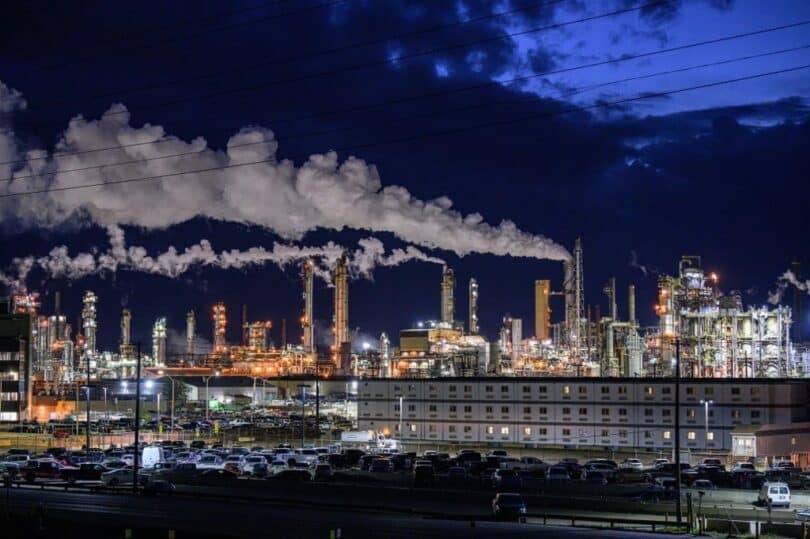Climate activists have warned that the EU process is far too little, too late. Amendments to the treaty require unanimity and have previously taken years to complete. And activists also warn that Brussels’ plan, even if it is eventually agreed, would allow investors to set up headquarters in other jurisdictions, such as the UK and Switzerland, where they could launch new settlement claims.
She also warned that the reform would still leave Europe and other contracting parties exposed to compensation suits over polluting non-fossil fuel energy sources, such as hydrogen and biomass.
Energy war
The problems with European energy policy have been thrown into stark relief too by the current war in Ukraine. That has sent energy prices – alongside energy industry profits – soaring. It has also seen Europe scrambling for new sources of energy, including shipments by the US of a glut of liquified natural gas (LNG) resulting from increased fracking. Such shipments have more than doubled over the past year.
A new report by 50 watchdog groups notes that fossil fuel companies have been “happy to take advantage” of the chaos in the global energy market from the war, channelling their profits into fracking and new infrastructure to export liquified natural gas.
Reversing course on this fossil fuel bonanza would most likely result in yet more damages claims under the energy treaty in years to come.
The secretary general of the Energy Charter Treaty has cited the Ukraine war as a reason why EU members should not quit the pact, arguing that such a move would add to Europe’s energy insecurity by antagonising alternative suppliers to Russia, such as Azerbaijan.
But in reality, the treaty is deeply bound up with the origins of the war and its continuing geopolitical reverberations – all of them disastrous for the environment.
Through the 2000s, the treaty provided the background to an energy war between Russia and Ukraine as the economies of both continued to struggle in the aftermath of the collapse of the Soviet Union.
Moscow was incensed by Kyiv’s failure to pay its debts on gas supplies, and also accused it of stealing gas in transit to Europe, Russia’s biggest customer. In response, Russia twice shut down supplies through its Ukrainian grid, the second time – in early 2009 – depriving Europe of gas too. The cut-off came during one of Europe’s coldest winters.
Investors in Russia’s gas giant Gazprom and Ukraine’s national utility Naftogaz spent years battling out various disputes in arbitration courts. It was the failure of the treaty to resolve these that led Moscow to pull out in 2009.
These tensions exacerbated too the split between Ukrainian politicians that looked to Moscow for security, including energy security, and those that preferred to ally with the EU and Nato. Ultimately that division, and the Ukrainian civil war it engendered, triggered Russia’s invasion and contributed to the decision by the US and Europe to get directly involved in the war by supplying weapons to Ukraine.
Pipeline explosions
European concerns about the security of Russian gas supplies through Ukraine led to the construction of two pipelines – Nord Stream 1 and 2 – from Russia direct to Germany through the Baltic Sea. The first opened in 2011, while the second was finished in 2021.
But that simply shunted problems caused by the energy treaty further down the line. As the West intensified its hostility towards Russia, especially following the invasion of Ukraine in February, Germany found itself caught in the middle.
If it accepted Russian gas through Nord Stream for domestic heating and its industries, it risked running foul of the West’s sanctions programme. But if it reneged on the deal, it could be sued under the terms of the energy treaty by European firms invested in the project.
As Germany’s former environment minister, Svenja Schulze, observed back in February of her country’s problem: “We also run the risk of ending up in international arbitration courts with compensation claims if we stop the project.” Instead, Germany tried to buy time by delaying Nord Stream 2’s certification.
Berlin’s conundrum about how to proceed was finally solved last month when a series of explosions tore large holes in both the Nord Stream 1 and 2 pipelines. Russia has been excluded from the investigations, while Germany, Sweden and Denmark have so far kept their findings under wraps.
Sweden has said it cannot formally share information from its criminal investigation because of “national security”.
All of this should be cause for deep concern. The energy treaty not only acts as a major disincentive to a much-touted green new deal, but it also helps perpetuate the very energy conflicts and wars that have undermined progress towards the international cooperation necessary to curb emissions.
Experts are agreed that the world is on the very edge of a climate precipice if urgent action is not taken to cut emissions. And yet the legal architecture of energy regulation breeds distrust and antagonism, pitting states against each other – and against the future of humanity.
The views expressed in this article belong to the author and do not necessarily reflect the editorial policy of Middle East Eye.
This article is available in French on Middle East Eye French edition.

